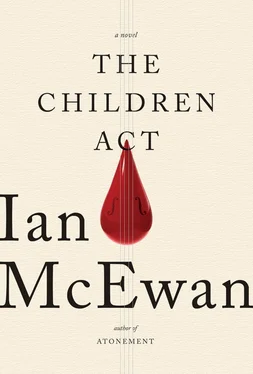“Why are they refusing?”
“Jehovah’s Witnesses, My Lady.”
“Right.”
“The hospital’s looking for an order that it will be lawful to proceed against their wishes.”
She looked at her watch. Just past ten thirty.
“How long have we got?”
“After Wednesday it will be dangerous, they’re saying. Extremely dangerous.”
She looked around her. Jack had already left the room. She said, “Then list it for hearing on short notice at 2 p.m. on Tuesday. And give notice to the respondents. Direct the hospital to inform the parents. They’ll have liberty to apply. Have a guardian appointed for the boy with legal representation. Direct the hospital to serve evidence by 4 p.m. tomorrow. The treating oncologist should serve a witness statement.”
For a moment her mind blanked. She cleared her throat and continued. “I’ll want to know why blood products are necessary. And the parents should use their best endeavors to file their evidence by noon on Tuesday.”
“I’ll do it straightaway.”
She went to the window and stared across the square, where shapes of trees were turning solid black in the last of the slow June dusk. As yet, the yellow streetlights illuminated no more than their circles of pavement. The Sunday-evening traffic was sparse now and barely a sound reached her from Gray’s Inn Road or High Holborn. Only the tap of thinned-out raindrops on leaves and a distant musical gurgling from a nearby drainpipe. She watched a neighbor’s cat down below pick a fastidious route around a puddle and dissolve into the darkness beneath a shrub. It didn’t trouble her, Jack’s withdrawal. Their exchange had been heading toward excruciating frankness. No denying the relief at being delivered onto the neutral ground, the treeless heath, of other people’s problems. Religion again. It had its consolations. Since the boy was almost eighteen, the legal age of autonomy, his wishes would be a central concern.
Perhaps it was perverse to discover in this sudden interruption a promise of freedom. On the other side of the city a teenager confronted death for his own or his parents’ beliefs. It was not her business or mission to save him, but to decide what was reasonable and lawful. She would have liked to see this boy for herself, remove herself from a domestic morass, as well as from the courtroom, for an hour or two, take a journey, immerse herself in the intricacies, fashion a judgment formed by her own observations. The parents’ beliefs might be an affirmation of their son’s, or a death sentence he dared not challenge. These days, finding out for yourself was highly unconventional. Back in the 1980s a judge could still have made the teenager a ward of court and seen him in chambers or hospital or at home. Back then, a noble ideal had somehow survived into the modern era, dented and rusty like a suit of armor. Judges had stood in for the monarch and had been for centuries the guardians of the nation’s children. Nowadays, social workers from Cafcass did the job and reported back. The old system, slow and inefficient, preserved the human touch. Now, fewer delays, more boxes to tick, more to be taken on trust. The lives of children were held in computer memory, accurately, but rather less kindly.
Visiting the hospital was a sentimental whim. She dismissed the idea as she turned from the window to go back to her couch. She sat down with an impatient sigh and took up her judgment in the matter of the Jewish girls from Stamford Hill and their contested well-being. Her last pages, her conclusion, were again in her hands. But for the moment she couldn’t bring herself to look at her own prose. This was not the first time that the absurdity and pointlessness of her involvement in a case had temporarily disabled her. Parents choosing a school for their children—an innocent, important, humdrum, private affair which a lethal blend of bitter division and too much money had transmuted into a monstrous clerical task, into box files of legal documents so numerous and heavy they were hauled to court on trolleys, into hours of educated wrangling, procedural hearings, deferred decisions, the whole circus rising, but so slowly, through the judicial hierarchy like a lopsided, ill-tethered hot-air balloon. If the parents could not agree, the law, reluctantly, must take the decisions. Fiona would preside with all the seriousness and obedience to process of a nuclear scientist. Preside over what had begun with love and ended in loathing. The whole business should have been handed to a social worker, who could have taken half an hour to reach a sensible decision.
Fiona had found in favor of Judith, the fidgety ginger woman who, the clerk reported, at every break would dash across the marbled floors and through the polished stone arches of the Courts of Justice and out into the Strand to get to her next cigarette. The children should continue to attend the mixed school chosen for them by their mother. They could stay on until they were eighteen and have tertiary education if they so chose. The judgment paid respect to the Haredi community, the continuity of its venerable traditions and observances, adding that the court took no view of its particular beliefs beyond noting that they were clearly sincerely held. However, witnesses from that community called by the father had helped undo his case. One respected figure had said, perhaps too proudly, that Haredi women were expected to devote themselves to making a “secure home” and that education past sixteen was not relevant. Another said it was highly unusual even for boys to enter the professions. A third had been a little too emphatic in his view that girls and boys should be kept well apart at school in order to maintain their purity. All this, Fiona had written, lay well outside mainstream parental practice and the generally held view that children should be encouraged in their aspirations. This must also be the view of the judicial reasonable parent. She accepted the social worker’s opinion that if the girls were to be returned to the closed society of the father, they would be cut off from their mother. The reverse was less likely to be the case.
Above all, the duty of the court was to enable the children to come to adulthood and make their own decisions about the sort of life they wanted to lead. The girls might opt for their father’s or their mother’s version of religion, or they might find satisfaction in life elsewhere. Past eighteen they would be beyond the reach of parents and court. In parting, Fiona lightly rapped the paternal knuckles when she observed that Mr. Bernstein had availed himself of female counsel and solicitor, and benefited from the experience of the court-appointed social worker, the astute and disorganized Cafcass lady. And he was implicitly bound to the order of a female judge. He should ask himself why he would deny his daughters the opportunity of a profession.
It was done. The corrections would be typed into her final draft early tomorrow morning. She stood and stretched, then picked up the whisky glasses and went to the kitchen to wash them. The warm water flowing over her hands was soothing and held her at the sink for a blank minute or so. But she was also listening out for Jack. The rumble of the ancient plumbing would let her know if he was preparing for bed. She went back into the sitting room to turn out the lights and found herself drawn again to her position at the window.
Down in the square, not far from the puddle that the cat had stepped around, her husband was towing a suitcase. Supported by a strap from his shoulder was the briefcase he used for work. He reached his car, their car, opened it, put his luggage on the back seat, got in and started the engine. As the headlights came on and the front wheels turned at full lock so that he could maneuver out of a tight parking space, she heard faintly the sound of the car radio. Pop music. But he hated pop music.
Читать дальше












